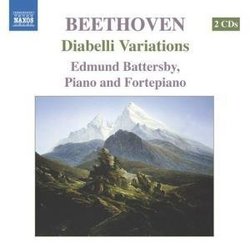| All Artists: Ludwig van Beethoven, Edmund Battersby Title: Beethoven: Diabelli Variations Members Wishing: 0 Total Copies: 0 Label: Naxos Original Release Date: 1/1/2005 Re-Release Date: 8/16/2005 Genre: Classical Styles: Chamber Music, Historical Periods, Classical (c.1770-1830) Number of Discs: 2 SwapaCD Credits: 2 UPC: 747313238422 |
Search - Ludwig van Beethoven, Edmund Battersby :: Beethoven: Diabelli Variations
 | Ludwig van Beethoven, Edmund Battersby Beethoven: Diabelli Variations Genre: Classical
|
Larger Image |
CD Details |
CD ReviewsSo nice to have Steven Guy | Croydon, South Australia | 10/04/2005 (5 out of 5 stars) "I bought this disc for the fortepiano rendition of the Diabelli Variations and I recommend this recording to all. Mr. Battersby's recording on a copy of a Konrad Graf fortepiano is one that I will be listening to and enjoying for many years to come. The music is played with great passion and verve. I must confess that I am far less interested in the second CD which features Mr. Battersby playing the same work on a modern Steinway piano. I would have preferred a second disc containing more of Beethoven's piano works played on the Graf instrument - perhaps one of the late sonatas? However, many will find the comparison interesting. Perhaps lovers of the HIP approach will regard the second disc as proof that the authentic instrument sounds better and those who scorn the period instrument approach will dutifully ignore the fortepiano disc? The fortepiano disc is so good that I am tempted to give away the Steinway disc. As far as I know, this is the only recording of the Diabelli Variations on a fortepiano. Bravo, Naxos! And thank you so much, Mr. Battersby! I hope this fine [forte]pianist makes many more recordings of Beethoven's music for Naxos in the future." Battersby's Diabelli Donald Mintz | 09/16/2005 (5 out of 5 stars) "First a disclosure. Edmund Battersby and I have been good friends for decades. However, it does not follow that I like everything he does. I do like the Diabelli recording--very much in fact. It seems to me that it is a stunning acheivement both technically and musically. In particular: the relationship between drive and relaxation is supremely well brought out. Are there things I would do differently if I were able to play this piece (which I most definitely am not)? Yes, of coursse. No one with any knowledge of and feeling for a piece like this will agree with every aspect of any performance. No matter. What you hear on this recording is exemplary and exciting (not necessarily the same thing), quite apart from the obvious interest of hearing the piece on both a modern and a contemporaneous instrument. Hence five stars. Donald Mintz Prof emeritus of music history Montclair (NJ) State University" Not the first, but the only one currently available. Scratcher | UK | 07/23/2006 (4 out of 5 stars) "[Originally posted July 2006] This is not the first commercial recording of the Diabellis played on a fortepiano to be issued, but since that by Jörg Demus, on Archiv, was in the LP era, and has not been re-issued on CD yet, it is the only recording on such an instrument available, (funnily enough, Demus used a Graf from around the same time as that copied by R.J. Regier and used by Mr. Battersby). The two performances (Battersby's and Demus's) are very different, but each throws illumination on a work which has become somewhat encrusted with a patina associated with the modern grand piano. As others have, I find the performance on the fortepiano much the more interesting of the two offered by Edmund Battersby. Would that the Demus was also available for a different view, but Battersby's is well worth getting, to my ears.
[Update April 2007] - I now find there is a very fine CD of the Diabellis, coupled with the Op. 126 Bagatelles, played by Paul Komen (1824 Graf) on the Ars Musici label (AM 1382-2). I find it supperior in just about every respect, but would still recommend Battersby if cost is an important factor." |

 Track Listings (33) - Disc #1
Track Listings (33) - Disc #1